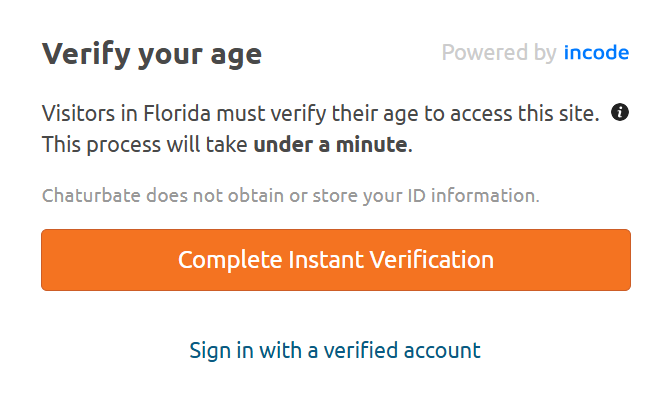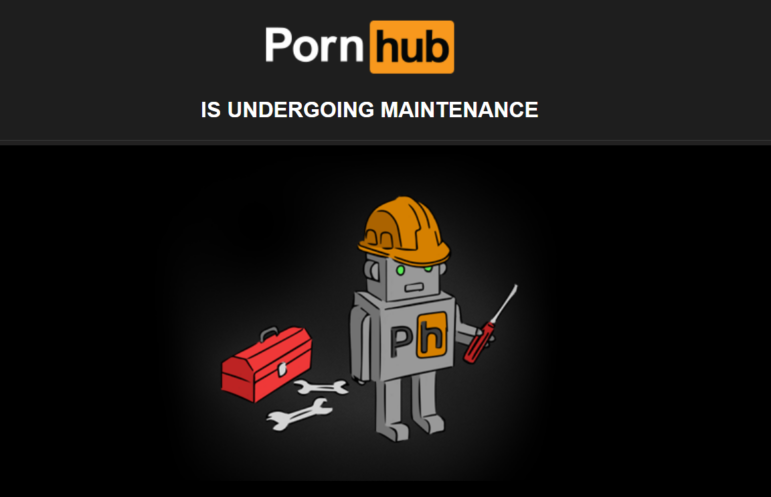
On January 1, 2025, with little fanfare, new laws quietly took effect in Texas and Florida. These laws represent a new front in advancing Christian dominion theology, imposing a hypocritical moral code on everyone regardless of their faith.
At the stroke of midnight, anyone attempting to access a website deemed pornographic from an IP address located in Florida encountered a pop-up message stating that the site was either undergoing maintenance or requesting the user to verify their age. These laws, promoted by supporters of President-elect Donald Trump, have prompted several major adult websites, including the industry leader Pornhub, to restrict access for users in these states rather than incur significant compliance costs. Some other platforms, such as Chaturbate — an adult streaming site where performers broadcast in real-time to a global audience—have also been affected.
Chaturbate, in particular, signified a shift in the adult entertainment industry by empowering independent content creators. Unlike traditional adult media, which relies on studios and producers, cam models on Chaturbate maintain control over their content, schedules, and interactions. This autonomy has made the platform popular among performers seeking financial independence and direct engagement with their audience.

A screenshot of the new content verification system for Chaturbate that applies to residents of Florida.
The rise of Chaturbate and similar platforms has contributed to the normalization of streaming live adult content, or “camming,” as both a form of entertainment and a means of income generation. These platforms have sparked broader discussions about sex work, digital labor, and the economics of adult content creation in the 21st century. Many performers navigate a complex blend of empowerment, digital entrepreneurship, and societal stigma, making sites like Chaturbate central to ongoing debates about online adult content and its place in society.
Some aspects of these laws are not entirely new. Over the past two and a half years, 19 states — representing more than one-third of the U.S. population — have enacted legislation mandating that pornographic websites verify users’ ages through various methods, including government-issued ID checks and facial recognition technology.
A few states have gone even further by requiring porn sites to display “health warnings.” For instance, Alabama mandates that sites warn users that pornography is “proven to harm human brain development” and “increases the demand for prostitution, child exploitation, and child pornography.”
Meanwhile, Kansas has broadened its definition of pornography to include any act of “homosexuality.”
In April 2024, the U.S. Supreme Court declined to block a Texas law mandating online age verification for accessing pornographic websites, setting the stage for a clash between the state’s Republican-led effort to shield minors from explicit content and constitutional concerns over free speech. Without any publicly noted dissents, the justices rejected a request from a trade group representing adult entertainment performers and other challengers to pause a lower court ruling that found the law likely did not infringe on First Amendment protections against government regulation of speech.
These laws are presented as measures to protect children. Supporters argue that mandatory age verification is a practical solution to prevent minors from accessing explicit material. While this intent may appear reasonable on the surface, the material that children are exposed to is ultimately a parental responsibility — a point often emphasized by conservative Christians who have long championed parental control over access to material in schools and libraries.
Moreover, the legislative strategy is ineffective, and lawmakers are likely aware of this. The simplest workaround is to mask an IP address using a virtual private network (VPN). Today’s tech-savvy youth possess the skills to bypass these kinds of restrictions with ease.
Pornhub and the adult industry are fighting back.
Next week, the Supreme Court will hear a challenge to the constitutionality of recently enacted age verification laws, setting up a high-stakes debate over free speech, censorship, and online child protection. The outcome could potentially weaken key precedents safeguarding access to adult content, reflecting the court’s recent trend of overturning long-established legal rulings.

PornHub’s “under maintenance” image, which is the only content now accessible to residents of states like Florida and Texas.
Why should Pagans care? Because these legislative efforts impose a specific moral code onto the public, threaten free speech, and compromise user privacy. The Kansas law already shows that “pornography” will be treated as a flexible category, one that can be used as a weapon against anyone who lives outside a straight, monogamous, cisgender way of life under a male head of household – like many Pagans.
These laws are designed not only to enforce a conservative Christian moral framework but also to silence dissent and promote tracking and disclosure, effectively creating a list of adult content viewers.
“Porn is the canary in the coal mine of free speech,” said Mike Stabile, a spokesperson for the Free Speech Coalition, a trade group representing the adult entertainment industry and a plaintiff in the lawsuit against Texas.
This legislative push is part of a broader strategy linked to Project 2025, the policy program backed by key conservative groups. The primary advocates for state-level anti-porn legislation — the Center for Renewing America, led by former Trump administration official Russell Vought, and the faith-based American Principles Project — both sit on the advisory board of Project 2025.
In a hidden camera video released in 2024 by the Center for Climate Reporting, Vought expressed a desire to ban pornography outright. “We’d have a national ban on pornography if we could,” he stated.
Acknowledging that such a move would be both unpopular and likely unconstitutional, Vought advocated instead for using laws aimed at restricting minors’ access to undermine the adult industry indirectly. “We’ve got several states passing these laws, and what happens is the porn company says, ‘We’re not going to do business in your state,’ which, of course, is exactly what we were aiming for, right?” Vought said. “We’re approaching it indirectly, starting with the kids.”
The Supreme Court should intervene to stop this erosion of constitutional protections, but given its current trajectory, there is reason to doubt it will. This could pave the way for the next phase of Vought’s agenda, which he has been explicit about.
“Our laws are built on the Judeo-Christian worldview value system… I want to make sure that we can say we are a Christian nation,” Vought has declared. “And my viewpoint is mostly that I would probably be Christian nation-ism. That’s pretty close to Christian nationalism because I also believe in nationalism.”
This isn’t about protecting children: it’s about control and suppression. The strategy to respond isn’t entirely clear, but it likely involves supporting organizations fighting for free speech and doing what we can to expose the truth.
What is clear, however, is that the words of Avram Finkelstein, Jorge Socárras, Chris Lione, Charles Kreloff, Oliver Johnston, and Brian Howard during the AIDS crisis in 1986 remain as relevant today as ever:
Silence = Death.
The Wild Hunt is not responsible for links to external content.
To join a conversation on this post:
Visit our The Wild Hunt subreddit! Point your favorite browser to https://www.reddit.com/r/The_Wild_Hunt_News/, then click “JOIN”. Make sure to click the bell, too, to be notified of new articles posted to our subreddit.